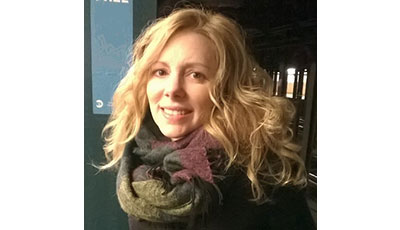
In 2008, Amy Adamczyk, a professor of sociology at John Jay, wrote an article for the journal Social Science Research comparing attitudes toward homosexuality around the world. It became her most cited article, and went on to become one of the journal’s most downloaded articles. She realized that although researchers had studied perceptions of homosexuality in different countries and cultures, there was no book-length treatment of the subject, and certainly nothing written for a general audience. There now is, after Adamczyk expanded her research into a book, Cross-National Public Opinion about Homosexuality: Examining Attitudes Across the Globe, which was published Feb. 7 by the University of California Press.
“I’m fascinated by what I call contextual effects,” Adamczyk said. “It’s not so much about an individual’s own attitude, but how the way they feel about certain issues can be affected by their country and those around them.”
[In a related development, Adamczyk has been awarded a curriculum development grant from the University of Notre Dame’s Global Religion Research Initiative. The grant will support her development of a new seminar that will examine theoretical and empirical literature on the relationship between religion and attitudes and behaviors that may be seen as deviant, moral, or illegal.]
 For her new book, Adamczyk identified three distinct factors that influence how tolerant or oppressive a country may be toward homosexuality: economic development, level of democracy, and religious context. Of those, she said, economic development is the most influential.
For her new book, Adamczyk identified three distinct factors that influence how tolerant or oppressive a country may be toward homosexuality: economic development, level of democracy, and religious context. Of those, she said, economic development is the most influential.
“In general the poorest countries tend to be the most against homosexuality. They have the most stringent laws and people living there are the most opposed,” she said. The countries with the strictest anti-homosexuality laws are almost all located in Africa or the Middle East, she pointed out, including the 10 where homosexuality is punishable by death.
“When you’re living in a very poor country and your kids are starving and your husband might be taken off to war, you’re focusing on basic level concerns like obtaining food and clean water,” Adamczyk explained. “You learn that if you stick with others and help the community, it will help you survive.” In this way, a group mentality develops, encouraging a homogeneous world view instead of emphasizing each individual’s perspective, as we do in the West.
“When a nation is doing better economically and everyone is feeling secure, your concerns change,” Adamczyk said. Richer countries tend to be more democratic, which in turn typically increases their acceptance of homosexuality. “Freedom of speech allows you to protest and not be arrested,” she continued. “You can express ideas without repercussions. So you develop trust and you can speak out for other people.”
Adamczyk went on to note that some religions are more effective at getting their followers to adhere to a strict belief system that frequently translates into an oppressive stance toward homosexuality. In the United States, for example, some Protestant denominations have led the charge in rallying members to oppose equal rights for gays and lesbians. In Muslim countries, meanwhile, “they institute laws that support their sexual morality stance,” Adamczyk noted. “They have rules about premarital sex and interactions between men and women for example. Homosexuality isn’t necessarily their main issue, they’re against all forms of sexual immorality.”
While many places in the world are still fiercely opposed to homosexuality, Adamczyk says that the world in general is moving in a direction of greater acceptance. “In general attitudes are becoming more liberal and so are the laws,” she said.
But there is also the occasional backlash. Uganda, for example passed a law in 2014 that many referred to as the “Kill the Gays” bill. It was later repealed. “Maybe they can’t make the changes they really need, which are probably economic,” Adamczyk explained, “so they pick on an issue they can make a change about, and use gay people as scapegoats.”



